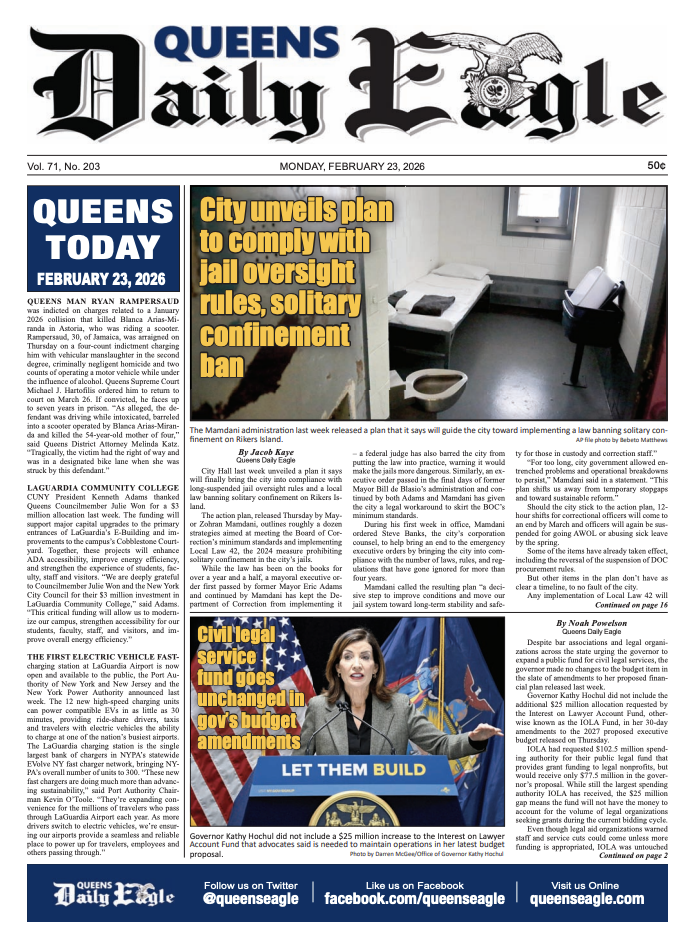Jamaica Affordable Housing Giant Hit With AG Lawsuit
/Attorney General Letitia James has sued Jamaica-based Zara Realty on behalf of tenants forced to pay exorbitant fees for building keys, security deposits and advance rent. The lawsuit alleges that the practices violate rent-stabilization laws. Photo via Attorney General Letitia James/Twitter.
By David Brand
The state attorney general hauled Jamaica property giant Zara Realty to court on Friday, stating in a lawsuit that Zara’s practice of nickel-and-diming thousands of low- and middle-income tenants violates rent-stabilization law.
Attorney General Letitia James on Friday announced the lawsuit against Zara Realty, which owns at least 2,500 rent-stabilized apartments in 38 buildings in the Jamaica area. The attorney general’s office and the state’s Homes and Community Renewal (HCR) agency filed the lawsuit in New York County Supreme Court.
“For years, Zara Realty has engaged in an egregious pattern of tenant harassment and exploitation,” James said. “Evading our rent regulation laws and forcing low-income tenants to pay exorbitant fees for fake services is deception of the worst kind. This is a notice to all unscrupulous landlords who seek to hurt New Yorkers, we will not tolerate this behavior.”
Zara is headquartered at an office on Hillside Avenue and the company owns properties throughout Jamaica, including Zara Luxury Apartments on 88th Avenue and Hillside Place on 167th Street in Jamaica Hills, which advertises a “$99 move-in special” on its Apartments.com listing.
The lawsuit was the result of a two-year investigation by the Tenant Protection Unit of HCR, James said, and alleges that Zara breaks the law by charging new tenants for building keys and by demanding excessive security deposits and advance rent payments. Zara also violates rent-regulation laws by charging broker’s fees through a third-party LLC, the complaint states.
According to the complaint, Zara Realty charges its tenants up to $200 for new keys when it purchases a building and changes the front door locks. Some tenants paid more than $11,000 before moving into their rent-stabilized apartment, the attorney general’s office said.
Assemblymember Alicia Hyndman said she has long been familiar with Zara’s “deceitful tactics.”
“It happened to me as a young single mother in the early 2000s, when I rented a studio apartment from them,” Hyndman said. “While we must remember that they are alleged to have harassed and extracted additional fees from tenants, I can’t help but wonder if what happened to me happened to others at the hands of Zara Realty.”
Zara’s attorneys Niles Welikson and Randi Gilbert of Horing Welikson & Rosen, P.C refuted the claims in the lawsuit and said that the company is committed to the community.
“The company purchases older buildings, many of which have a long history of neglect by prior owners, and invests in new infrastructure — including boilers, windows, facades and roofs, security systems, renovations to individual units and other amenities — all in service of creating high-quality affordable housing for tenants,” Welikson and Gilbert said. “The turnover rate among rent-regulated tenants in Zara buildings is low and the company has never sold a building it purchased in Queens.”
The attorneys said Zara has worked with the HCR Tenant Protection Unit to resolve the issues now included in the lawsuit.
“The allegations contained in this suit, many of them factually inaccurate, will be vigorously contested,” they said. “Many of them also deal with highly complicated legal issues that are subject to various interpretations under the law, including conflicting judicial opinions.”
Lease terms, late fees and key costs all comply with the law, Welikson and Gilbert said.
“Zara is proud to invest in its properties for the benefit of tenants and all MCIs are approved by DHCR itself,” they said. “Zara is committed to continuing to work to ensure that the organization provides high-quality, safe and modern affordable housing for their thousands of tenants.”
The action by the state attorney general’s office is not the first time that Zara Realty has been sued over its fees and practices for tenants rent-regulated apartments.
In March 2018, the Urban Justice Center sued Zara Realty in Queens Supreme Court for using a “predatory business strategy of increasing revenues through unlawful means.” Several Zara tenants are included as plaintiffs in the lawsuit.
In addition to charging key fees, Zara pressures tenants to sign “vacancy leases” that jeopardize their rent stabilization in order to add household members to their leases and compels tenants to share their bank account numbers, which Zara uses to withdraw excessive amounts from tenants’ accounts, the complaint states.
Zara also intimidates tenants seeking to organize, the complaint states.
“When they have sought to organize in their building to protect their tenancy rights, they have been subjected to Defendants' agents and/or employees looming over their meetings in the public areas of the building and photographing the tenants in attendance,” the complaint states.




